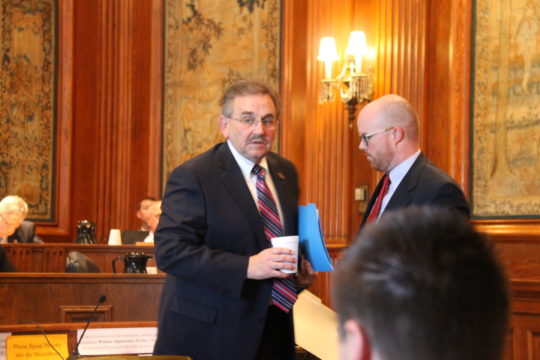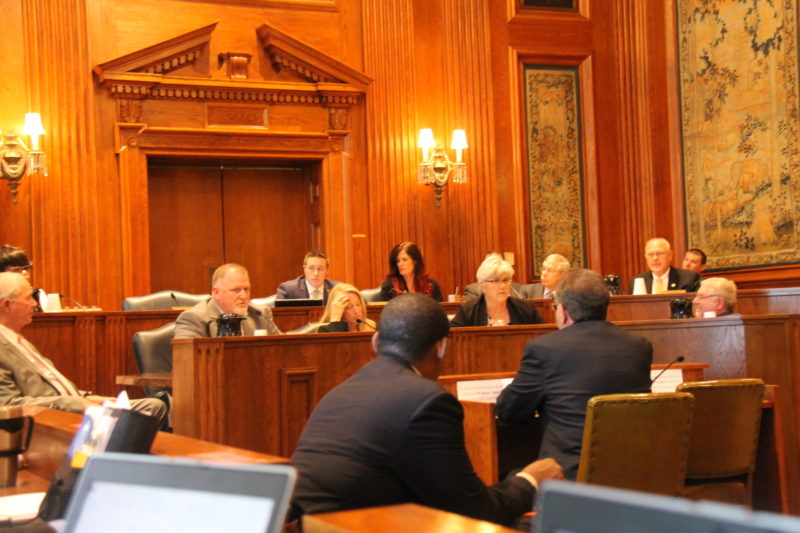JEFFERSON CITY, Mo. – The Missouri Senate Committee on Commerce, Consumer Protection, Energy, and the Environment has signed off on a bill seeking to bring jobs to southeastern Missouri, despite a number of concerns.
After hours of testimony, the committee finally passed HB 1 unchanged with a vote of 10-1. Sen. Jamilah Nasheed was the only vote against the legislation.
HB 1 bill seeks to give the Missouri Public Service Commission (PSC) special authority to offer a lower rate to steel mills, aluminum smelters and other large consumers of electricity. If passed, a steel mill would reportedly move to New Madrid, while Magnitude 7 would kickstart the old Noranda aluminum smelter.
To some, it signals that passage of the bill is imminent. But to others, it’s just a delaying of the true action, with senators holding their true intent to address their issues with the legislation when it reaches the Senate floor.
Many have wondered if the legislation can make it through Missouri’s upper chamber, as the issue met a strong amount of opposition when it previously made its way through as part of SB 302 during the regular legislative session.
But it seems some of that opposition has been met, as the bill was, in effect, watered down into a version that would be seen more favorably by the senators leading the opposition, namely Sen. Doug Libla and Sen. Gary Romine.

In fact, both senators have helped work on the bill language throughout the week to guide what the Senate would eventually hear.
Nothing reflects that change more accurately than the fact that the Senate sponsor of the bill is Libla.
The pros
The mission to bring jobs to the boot heel has turned into a rallying cry for many, an effort to stabilize a region long living in a state of poverty.
“Our area is crippled, and very much so,” New Madrid City Administrator Richard McGill said. “We have nine of the 10 poorest counties in the state. We’re the 11th poorest congressional district in the country. We see an opportunity here. Challenges present opportunities, and we’re seeing those now, and we have to seize them.”
The cons and corporate welfare
“Someone needs to tell Priscilla Ford that we might be raising your electric rates today,” Senator Rob Schaaf said on the Senate floor Thursday afternoon.
The senator from Buchanan County picked her name, completely at random, while thumbing through the Jefferson City phone book.
Sen. Dave Schatz said the gravest concern for the senators was that they do not want their constituents to bear the cost of what they call corporate welfare.
His fellow senator, Bill Eigel, had argued on the floor earlier in the day that the legislation creates imbalances in the free market system, saying it “ultimately hurts everyone else.”
Opponents testifying against the bill Thursday afternoon questioned its overall effect and called it an economic development tax on ratepayers.
“If you have a business model that only works by getting corporate welfare, it’s not a viable business model,” Sen. Andrew Koenig said on the Senate floor.
His point echoed that of Eigel, saying that HB 1 could potentially raise the rates of Ameren Missouri customers.
Cost to consumers?
“Will the special rate increase or decrease consumer’s bottom line?”
That was the question Sen. Jamilah Nasheed tried to get an answer to throughout the committee hearing, but no one seemed to have a straight response until the very end when Natelle Dietrich of the PSC came forward to answer the senators’ questions.
Dietrich came forward with a document produced by the PSC staff to identify both the low and high ends of the spectrum as to how much the rate increase could be. When combining the effects of both the steel mill and the smelter, the low end showed a possible increase of $1 in the 10th year, no changes in the first nine years.
But the high end, however, showed a possible increase of up to $57 in the third year. That would be the equivalent of an increase of $4.75 per month.
That, however, is still subject to whatever provisions the PSC might put on the potential deals, meaning that fluctuation in those numbers could change quite easily.
Who’s going to open the steel mill?
The question of who will run and operate the proposed steel mill still remains another hang-up for the bill as it works through the Senate, but an answer to that may have finally arrived.
Tony Messenger of the St. Louis Post-Dispatch broke news on Twitter Thursday morning, reporting that the India-based Sumangala Steel was the company in question. They also reportedly emailed and confirmed that the Southeast Missouri site had made an “advanced stage of shortlisting” along with other sites.
New Madrid City Administrator Richard McGill testified before the committee on Thursday, saying they had signed a confidentiality agreement and could not confirm or deny that Sumangala was the company they had been in discussion with.
He did say that, whomever the owner of the company was, they did not select Missouri, Missouri selected them, noting that they had reached out first.
Benjamin Peters was a reporter for The Missouri Times and Missouri Times Magazine and also produced the #MoLeg Podcast. He joined The Missouri Times in 2016 after working as a sports editor and TV news producer in mid-Missouri. Benjamin is a graduate of Missouri State University in Springfield.













